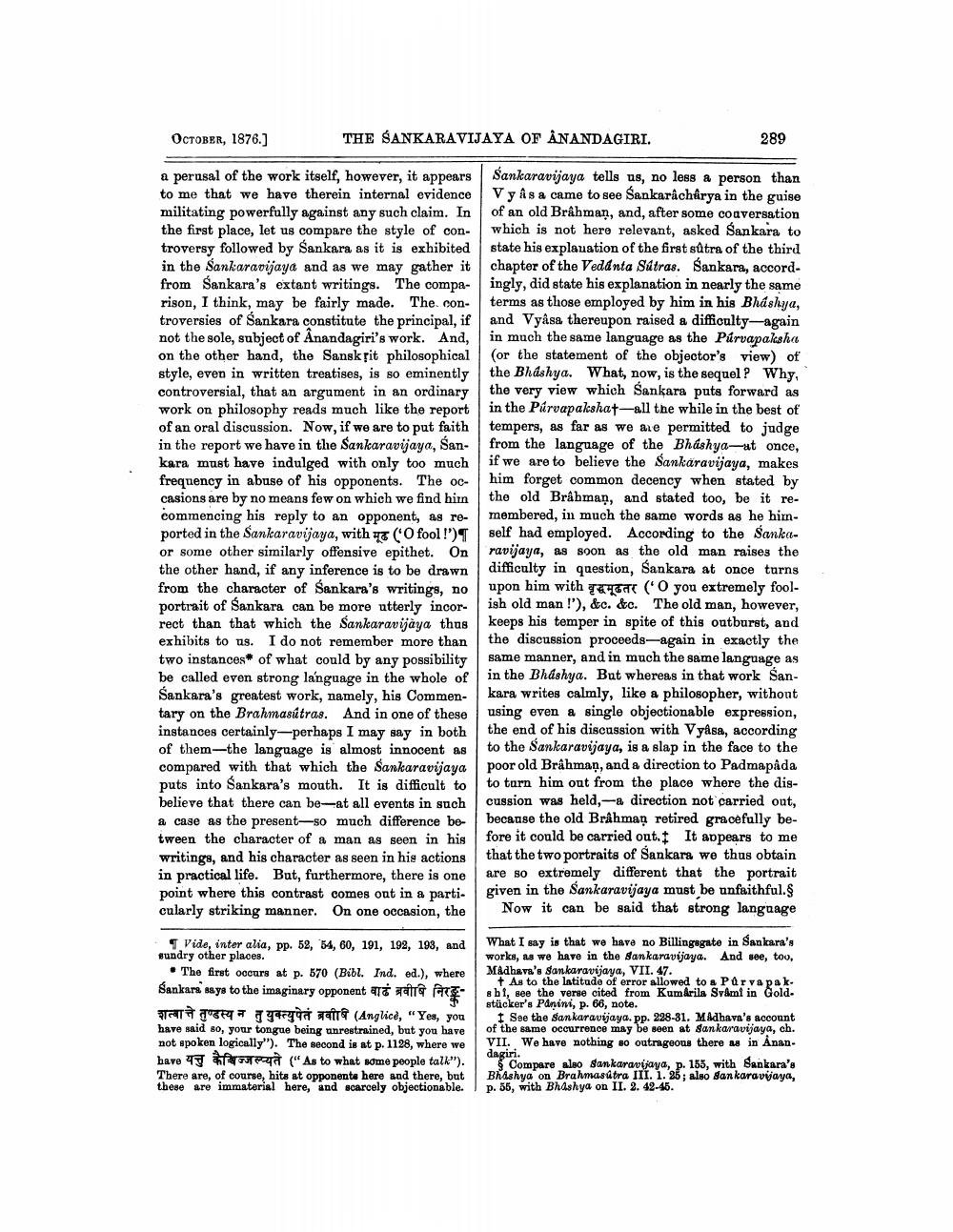________________
OCTOBER, 1876.]
THE SANKARAVIJAYA OF ÅNANDAGIRI.
289
a perusal of the work itself, however, it appears to me that we have therein internal evidence militating powerfully against any such claim. In the first place, let us compare the style of con- troversy followed by Sankara as it is exhibited in the Sankaravijaya and as we may gather it from Sankara's extant writings. The compa- rison, I think, may be fairly made. The controversies of Sankara constitute the principal, if not the sole, subject of Anandagiri's work. And, on the other hand, the Sanskrit philosophical style, even in written treatises, is so eminently controversial, that an argument in an ordinary work on philosophy reads much like the report of an oral discussion. Now, if we are to put faith in the report we have in the Sankaravijaya, San- kara must have indulged with only too much frequency in abuse of his opponents. The occasions are by no means few on which we find him commencing his reply to an opponent, as reported in the Sankaravijaya, with ("O fool!) or some other similarly offensive epithet. On the other hand, if any inference is to be drawn from the character of Sankara's writings, no portrait of Sankara can be more utterly incorrect than that which the Sankaravijaya thus exhibits to us. I do not remember more than two instances of what could by any possibility be called even strong language in the whole of Sankara's greatest work, namely, his Commentary on the Brahmasútras. And in one of these instances certainly-perhaps I may say in both of them--the language is almost innocent as compared with that which the Sankaravijaya puts into Sankara's mouth. It is difficult to believe that there can be-at all events in such a case as the present—so much difference be- tween the character of a man as seen in his writings, and his character as seen in his actions in practical life. But, furthermore, there is one point where this contrast comes out in a particularly striking manner. On one occasion, the
Sankaravijaya tells us, no less a person than V y as a came to see SankarachArya in the guise of an old Brahman, and, after some coaversation which is not here relevant, asked Sankara to state his explanation of the first sutra of the third chapter of the Vedanta Sutras. Sankara, accordingly, did state his explanation in nearly the same terms as those employed by him in his Bhashya, and Vyasa thereupon raised a difficulty-again in much the same language as the Púrvapaksha (or the statement of the objector's view of the Bhashya. What, now, is the sequel ? Why, the very view which Sankara puts forward as in the Parvapakshat-all the while in the best of tempers, as far as we are permitted to judge from the language of the Bhashya-at once, if we are to believe the Sankaravijaya, makes him forget common decency when stated by the old Brahman, and stated too, be it remembered, in much the same words as he himself had employed. According to the Sankaravijaya, as soon as the old man raises the difficulty in question, Sankara at once turns upon him with an (O you extremely foolish old man !'), &c. &c. The old man, however, keeps his temper in spite of this outburst, and the discussion proceeds-again in exactly the same manner, and in much the same language as in the Bhdshya. But whereas in that work Sankara writes calmly, like a philosopher, without using even a single objectionable expression, the end of his discussion with Vyasa, according to the Sankaravijaya, is a slap in the face to the poor old Brahman, and a direction to Padmapada to turn him out from the place where the digcussion was held,-a direction not carried out, because the old Brahman retired gracefully before it could be carried out. I It appears to me that the two portraits of Sankara we thus obtain are so extremely different that the portrait given in the Sankaravijaya must be unfaithful.
Now it can be said that strong language
5
1 Vide, inter alia, pp. 52, 64, 60, 191, 192, 193, and sundry other places.
• The first occurs at p. 570 (Bibl. Ind. ed.), where Sankara says to the imaginary opponent वाढं ब्रवीषि निरङ्क
Teater Tha y a atre (Anglice, "Yes, you have said so, your tongue being unrestrained, but you have not spoken logically"). The second is at p. 1128, where we have 4 Tea ("As to what some people talk"). There are, of course, bits at opponenta here and there, but these are immaterial here, and scarcely objectionable.
What I say is that we have no Billingsgate in Sankara's works, as we have in the Sankaravijaya. And see, too, Madhava's sankaravijaya, VII. 47.
+ As to the latitude of error allowed to a Parva pak. sbi, see the verse cited from Kumárila Syami in Gold. stücker's Panini, p. 66, note.
See the sankaravijaya. pp. 228-31. Madhava's account of the same occurrence may be seen at sankaravijaya, ch. VII. We have nothing so outrageous there as in Anan. dagiri.
Compare also sankaravijaya, p. 155, with Sankara's Bhashya on Brahmasdtra III. 1. 25; also san karavýaya, p. 55, with Bhashya on II. 2. 42-45.




